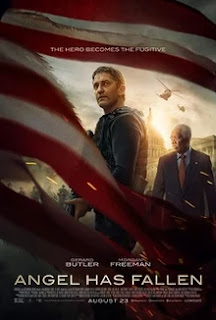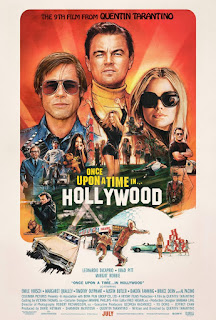"Mike Banning, You’re Being Charged For The Attempted Murder Of The President Of The United States..."
Declaring himself with a beaming smile as the world's worst actor come the conclusion of 2016, a year in which film fans across the world were "treated" to the double delight of both Gods of Egypt and London Has Fallen, two films which will forever remain as prime examples of cinematic garbage at its' most wretched and unbearable, the Scottish cash-grab that is Gerard Butler once again returns to the big screen with yet another entry into the "Has Fallen" film series with Angel Has Fallen, an equally poor attempt at furthering the saga of Butler's super secret agent, Mike Banning, as we see the raggedy Bruce Willis wannabee framed for the attempted assassination of Morgan Freeman's (The Dark Knight) peace-loving President of the United States, even after saving the world twice and being declared as a national hero. Plot holes aside, Angel Has Fallen sees Snitch director, Ric Roman Waugh, being handed the reigns for a movie which bears all the worst attributes you would expect from a recent Gerard Butler vehicle, albeit Den of Thieves which was actually very good, as it incinerates, massacres, stabs and blows its' way through a rather generic action plot with enough brute force to leave you with quite a nasty, elongated headache. We soldier on...
With London Has Fallen not only being a genuinely terrible excuse for a big-screen action movie as it succumbed to a jaw-dropping level of xenophobia and racism I had previously not overly noticed from a blockbuster shoot-a-thon, it does comes as a warm relief to report that Angel Has Fallen stays well clear from such levels of bad taste and instead holds out more so for the utter ridiculous. With the movie executives suddenly realising that Butler himself is no longer the fresh runner bean he may have been in the past, Angel Has Fallen does sort of start in semi-interesting fashion as we come face to face with the inevitable movie baddy in the first ten minutes alongside a focus on Banning himself, whose years of war and murder seem to have finally taken a toll on both his physical and mental capacity. As soon as the explosions occur however, all level of depth is completely dropped in favour of poorly CGI'd destruction, endless, pointless cannon fodder death and a central Taken meets Shooter plot line which doesn't make any sense whatsoever but still ends in exactly the same way you would expect from a film attempting to reach as wide an audience as possible. Add into the mix a strange cameo role from Jada Pinkett Smith (The Matrix Reloaded) and a laughably bad Nick Nolte (Warrior) and Angel Has Fallen is exactly the type of movie you suckers made possible by paying to see London Has Fallen, albeit one which actually does manage to improve on its' predecessor ever so slightly.
















